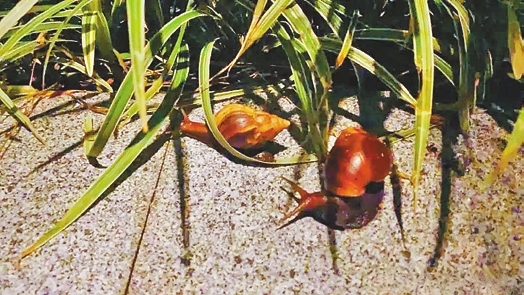
SOME Shenzhen netizens posted pictures of giant snails online that have largely appeared after the “dragon boat rain” in the city. Their sizes are so big that some netizens even joke that eating such a big snail will make you full, Southern Metropolis Daily reported. This species of snail is called Achatina Fulica and commonly known as giant African snail. It is one of the largest land snails in the world and originated in the coastal areas and islands of East Africa. The giant African snails were introduced to Fujian and Taiwan for breeding as food in the 1930s, but have such a quick reproduction cycle that they became one of the 16 species of the first batch of invasive creatures in China. These giant snails will eat out agricultural products including vegetables, crops or plants, thus listed as a Level-II harmful bio-organism by China’s entry and exit quarantine authorities. Additionally, the mucus and fecal matter of the snails can carry a large number of parasites which can spread diseases such as encephalitis and meningitis. After touching the giant African snails, it could be easy for a child to get infected with the parasites because of their low immunity. Some parents reflected on a WeChat Group set up by the Daily in August 2019, that one-third of students in a class had to take sick days off after catching the snails organized by the school. Some of the children got a fever that reached 40 degrees Celsius. However, claims that the students’ illness were linked to the snails have not been proved. Staff with the Longgang District Center for Disease Control and Prevention said that parasite infections of giant African snails are high. Thirty-one percent of the giant African snails in Shenzhen are infected with angiostrongylus cantonensis. Angiostrongylus cantonensis is a parasitic nematode that causes angiostrongyliasis, the most common cause of eosinophilic meningitis in Southeast Asia and the Pacific Basin. Snails that are infected with these parasites are not edible and should be treated cautiously. If people eat these snails or get in touch with their fecal matter or mucus, the angiostrongylus cantonensis will go into the human body and parasitize in the central nervous system or cerebrospinal fluid which might lead to fatal meningitis. Even if the infected snails are cooked thoroughly, eating or touching them still carries a risk of infection. If giant snails are found around a home, residents are advised to pour some salt on the snails. The snails will die when they come into contact with salt. (Chen Siqi) | 
